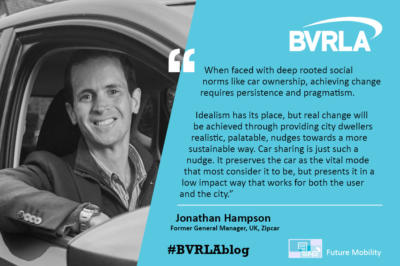Jonathan Hampson, former UK General Manager at Zipcar, reflects on over a decade in the car sharing business.

When I took the job at Streetcar 13 years ago, its founders Andrew Valentine and Brett Akker took a chance on me, I took a chance on them and the rest is history.
Their vision and foresight let me be a part of something hugely fulfilling. Not only have I had the privilege of seeing an organisation through multiple life stages and acquisitions, but I have also got to be part of a fundamental change in how we use cars in cities.
When we first started, the mobility paradigm and options available were simple: it didn’t get much more complicated than public transport and the private car. I remember early on in my car sharing career going to an industry event and feeling very much an outsider for suggesting that there may be another way.
Fast forward 10 years and the change is dramatic – the options available to city dwellers have proliferated and we have at least started on a path away from a city dominated by the inefficiency of the private car. Those who were sceptical many years ago are now the ones defining their organisations as mobility companies, rather than simply manufacturers.
As well as playing our part in facilitating a future away from the private car, I am also proud of the leadership position we have taken on electric vehicles. There were so many reasons to wait or to allow others to go first, but we made a decision to lead. And it has paid off: a million EV miles driven in our 325 e-Golfs in only 12 months is a good start to normalising a technology that I believe is essential if we are to meet our future challenges.
As much as there is some satisfaction to be gained from how far we have come, it is also inevitable to feel a sense of frustration at not having been able to go further and faster.
Our cities and our climate remain in crisis. The House of Commons Science & Technology Committee in their July “Clean Growth” report came to the following conclusion: “widespread personal vehicle ownership does not appear to be compatible with significant decarbonisation” and that usership should be encouraged in place of ownership. Such rational conclusion has not always been in common supply and getting things done in London has often felt akin to wading through treacle. Should it have been so difficult?
When faced with deep rooted social norms like car ownership, achieving change requires persistence and pragmatism. Idealism has its place, but real change will be achieved through providing city dwellers realistic, palatable, nudges towards a more sustainable way. Car sharing is just such a nudge. It preserves the car as the vital mode that most consider it to be, but presents it in a low impact way that works for both the user and the city.
However, too often the car has been the elephant in the room that no one wanted to address, talk about or provide a positive solution for. I sense this is changing, but I would continue to challenge policy makers on what their positive, progressive policy is on the car. You can have the best active travel policy in the world but unless you break the link with the private car, people will continue to make sub-optimal modal choices.
Whilst I may be moving on, I will always be a huge champion of Zipcar and the role of car sharing as one of the facilitators of modern, liveable, cities. I would really like to think that we have done some of the heavy-lifting and now can’t wait to see what the sector will do.
The BVRLA’s Cars in the City report provides some practical recommendations that local and national policymakers can use to start driving behaviour change.
Share this blog via your own channels:
Members can download the social media image resources available for free from our Communications Toolkit. Don't forget to tag us #BVRLAblog @bvrla.





